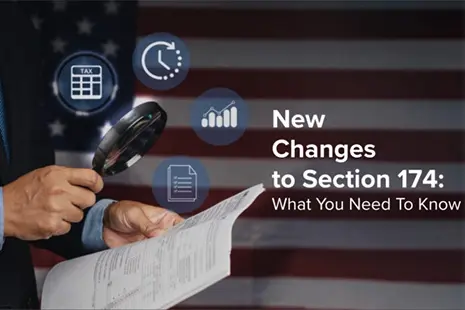The United States federal government recently denied a $1.3 million tax refund for multinational electronics manufacturer Kyocera, citing a lack of substantive evidence proving activities meet the IRC Section 41 R&D tax credit eligibility requirements.
The high-profile R&D tax credit refund case dovetails with a $5.73 million refund sought by Kyocera under IRC Section 965, and ultimately boils down to a lack of time-tracking during the 2018 tax years that would justify the payout.
The case came about following an amendment to the company’s 2018 R&D tax credit claim of $398,985. Kyocera partnered with PwC—one of the Big 4 accounting firms—to conduct a new claim study that involved interviewing 36 employees considered subject matter experts on the specific R&D activities in question.
The new claim—valued at over $1.3 million—was denied, with the government claiming that the 36 interviews failed to accurately account for the activities executed by the more than 1,200 employees involved in Kyocera’s R&D.
Specifically, the IRS requested time tracking documentation, which Kyocera doesn’t employee within its R&D unit, as well as supply chain and contract invoices to substantiate the new evidence.
As of August 2024, the US government has filed a motion to dismiss the claim “[b]ecause Kyocera did not track employees’ time on particular projects included in the study,” thus making it impossible for the company “to prove that the included employees satisfied the 80% threshold.”
The court cited the Little Sandy Coal v. Commissioner case from June 2023 in their move to dismiss Kyocera’s claim, where it was ruled by the 7th Circuit Court that “documentation on time spent on activities” was required to qualify for Section 41 refunds.”
It was PwC’s process that the IRS was especially critical of in their ruling, emphasizing that “[r]emarkably, PwC failed to keep records generated in its own study, nor did it provide them to Kyocera.“
To that end, “the lack of records means that [Kyocera] cannot demonstrate its entitlement to the section 41 credit at all, rather than only the amount being in question.”
Time tracking documentation—not interviews—key to qualification
The big takeaway here is that despite being one of the biggest accounting firms in the business, PwC was failing to follow best practices for documenting evidence for Kyocera’s R&D tax credit claim.
This was no small error, either, as the company lost out on not just their amended claim, but even the original refund from tax year 2018 once the error on PwC’s part came to light.
While oral testimonials and interviews are part of the R&D tax credit claim process, the IRS has made it clear in case after case that it requires objective documentation—not best guesses—to approve any refund claim.
This is both a challenge and an opportunity for businesses looking to claim the US R&D tax credit going forward.
For starters, this case has flipped the basis for how most claims are compiled—rather than starting from a place of “recollection” and human interviews reinforced by documentation, the documentation will instead be the starting point for any Section 41 claim. This all hinges on time tracking, and keeping extensive records of all your potentially credit-worth R&D activities.
Businesses can therefore no longer rely on estimates or best guesses to capture R&D tax credits. While this will raise the burden of proof required to capture tax credits, it puts the onus on claimants to be tracking time from the start.
While this will mean more documentation, that doesn’t have to mean more work when it comes to actually filing—or defending—an R&D tax claim.
By integrating with the time tracking systems that many of the most effective R&D teams are already using today, Boast can help teams actively and passively track qualifying work throughout the year, helping time actions to outcomes in near real time.
Boast’s platform accomplishes this by syncing with the payroll and financial systems relevant to these claims, creating a single source-of-truth and R&D intelligence that allows teams to understand their progress on specific projects throughout the year alongside their R&D tax credit eligibility.
To learn more about how teams can better track progress (and in the process streamline tax credit qualification), talk to one of our experts today.
Latest US R&D Tax Credit Court Ruling FAQ
- What recent development occurred in R&D tax credit claims? The US federal government denied a $1.3 million tax refund for Kyocera, a multinational electronics manufacturer, citing lack of substantive evidence for their IRC Section 41 R&D tax credit claim. The case highlights the importance of thorough documentation, especially time tracking, in R&D tax credit claims.
- What was the main issue with Kyocera’s R&D tax credit claim? The primary issue was a lack of time tracking documentation. Kyocera partnered with PwC to conduct a new claim study based on interviews with 36 employees, but failed to provide detailed time tracking records for the more than 1,200 employees involved in R&D activities.
- How did the IRS respond to Kyocera’s claim? The IRS was critical of PwC’s process, emphasizing that they failed to keep records generated in their study. The government filed a motion to dismiss the claim, citing that without proper time tracking, it’s impossible to prove that employees met the 80% threshold required for the credit.
- What precedent did the court cite in this case? The court cited the Little Sandy Coal v. Commissioner case from June 2023, which ruled that “documentation on time spent on activities” was required to qualify for Section 41 refunds.
- How does this ruling impact future R&D tax credit claims? This case emphasizes that objective documentation, particularly time tracking, is crucial for R&D tax credit claims. Businesses can no longer rely on estimates or best guesses. While this raises the burden of proof, it also presents an opportunity for companies to implement better time tracking systems from the start, potentially streamlining the claim process in the long run.


